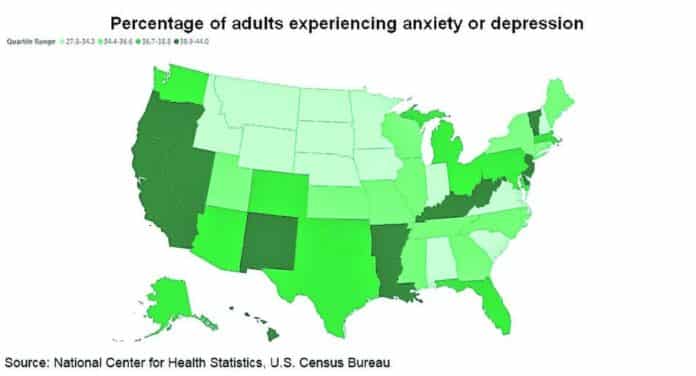Health experts across the country, including in Bartholomew County, are expressing concern that the coronavirus pandemic is fueling a mental health crisis that could stretch beyond providers’ capacity and leave behind a long-lasting impact on society.
Nearly four times as many adults in the United States are reporting symptoms of anxiety and depression compared to the first half of last year, according to a survey conducted between Sept. 30 and Oct. 12 by the National Center for Health Statistics and U.S. Census Bureau.
A total of 32.3% of survey respondents reported symptoms of anxiety as of two weeks ago, compared to 8.2% during the first half of last year, while 25.4% of respondents reported symptoms of depression, up from 6.6%, according to the survey.
Additionally, 13.3% of adult respondents in the United States reported starting or increasing substance use to cope with stress or emotional toll of the pandemic, and 10.7% of respondents said they had seriously considered suicide in the past month, according to a similar survey published by the CDC over the summer.
[sc:text-divider text-divider-title=”Story continues below gallery” ]Click here to purchase photos from this gallery
However, the pandemic is taking a much harsher toll on the mental health of young adults, minorities and individuals without a high school diploma, according to the two surveys.
Nearly 45% of adults ages 18 to 29 reported symptoms of anxiety and 39% experiencing symptoms of depression, and nearly 25% of adults ages 18 to 24 reported starting or increasing substance use and 25.5% considered suicide.
Additionally, 13.3% of adults in the United States reported starting or increasing substance use to cope with stress or emotional toll of the pandemic, including nearly 25% of adults ages 18 to 24. 10.7% said they
Local experts say they are seeing some similar patterns in Bartholomew County.
Family Service Inc., a mental health agency that offers counseling services located at 1531 13th St., has seen an increase in the number of clients seeking help for suicidal ideation, anxiety and depression, said executive director Julie Miller.
“We’ve had a lot more individuals with suicidal ideation, so those who have a plan, have thought about it,” Miller said. “Also, a lot more youth have reported (suicidal ideation) and anxiety and depression, and more youth have had to be hospitalized for behaviors.”
The end result of the dramatic rise in the number of people struggling with their mental health, Miller fears, could be an increase in suicides, substance abuse and even cardiovascular problems and diabetes.
“I think it’s going to impact our suicide rates,” she said. “I think we’ll see a higher suicide rate. I think we’ll see more individuals using substances just as a coping mechanism. I also think we’ll see a lot more possible unemployment, just because when you’re depressed, it’s sometimes hard to get out of bed to go to work.”
“It’s going to trickle down to almost every facet of your life, and so you’re going to see, I think, a lot more people struggling and needing help,” Miller added.
Challenges for providers
For Dr. Darrin Carr, clinical assistant professor of psychology and director of the master’s program in mental health counseling at IUPUC, one particularly challenging consequence of the increase in mental health-related issues is that it could add further stress on mental healthcare providers that were already being stretched thin before the pandemic.
“It’s important not to forget that the providers of these services, they themselves are under stress from the pandemic, and, you know, we are all only human,” Carr said.
On Wednesday, IUPUC held a virtual workshop via Zoom to help local healthcare, first responder and mental healthcare workers cope with their own personal concerns related to COVID while continuing to provide professional services, Carr said. About 25 people attended the event.
During the workshop, participants expressed some of the concerns and struggles they have had during the pandemic, including workload increases and transitioning from what was previously providing almost exclusively face-to-face services to remote services done virtually, Carr said.
Miller said Family Service has seen an increase in people reaching out for help, but some clients don’t feel comfortable with virtual therapy sessions.
“Our staff have not had a break,” Miller said. “They’re frontline workers as well and they have continued to work through this challenging time since March without a break, and they’re having to deal with a lot of the same things our clients are dealing with.”
Currently, only two of the organization’s 10 therapists are holding in-person sessions, and three are seeing clients in the public school system.
“I’m worried about stigma and people feeling safe to reach out,” Miller said. “I’m worrying about capacity and our community, whether we have enough therapists. And I’m worried about just people’s health in general because I think there’s no end in sight (to the pandemic). What people need is hope, right? The light at the end of the tunnel is hope, and so when you don’t see that, you don’t see the end of the tunnel, people lose their hope. That’s when you start to see people really decline in their mental health.”
The global outbreak of COVID-19 has sickened millions of people in the United States and killed at least 223,600, including at least 58 in Bartholomew County.
The crisis has also thrown millions out of work, crippled the economy and forced shutdowns of bars, restaurants, theaters and gyms and brought new stresses due to social isolation and the lack of traditional support systems such as family, friends, schools and other community organizations.
One of the challenges of the pandemic is that it’s a “hurry-up-and-wait situation” that appears to have no end in sight, Carr said.
“Unlike a natural disaster, for example, which are — don’t get me wrong — impactful and have significant negative impacts on folks, COVID-19 appears to be an unending situation,” Carr said. “It’s that chronic presence, that chronic stress that essentially has an erosive effect on folks. That’s why it’s important that we all take extra care of ourselves and extra care of each other.”
Drug overdoses increasing
The pandemic also has coincided with an alarming increase in many longstanding public-health issues in Bartholomew County, including substance abuse, drug overdoses and food insecurity, local officials said.
Bartholomew County has seen a surge in fatal drug overdoses so far this year, with 27 confirmed overdose deaths as of Thursday, with an additional suspected overdose death still pending toxicology testing, according to the Bartholomew County Coroner’s Office. There were 24 fatal drug overdoses in the county last year.
However, it is difficult to pinpoint the extent to which the increases in drug overdoses can be directly attributed to the impact of the pandemic. Ten of the 27 fatal overdoses occurred before March, when the pandemic took root in Indiana, according to county records.
In June, Columbus Regional Health’s Treatment and Support Center reported “an enormous spike” in drug relapses among clients during the pandemic.
The Columbus Police Department also saw an increase in domestic disturbances, domestic disputes, drug overdoses and alcohol-related calls, particularly during the early phases of the pandemic.
Additionally, food pantries in Bartholomew County have reported surges in the number of people seeking help with groceries. Last month, 550 families lined up in cars to receive food at Columbus Municipal Airport in the latest in a series of monthly food distributions organized by Indianapolis-based Gleaners Food Bank of Indiana. At one point, the line of cars stretched about a half-mile.
While events like pandemics can have long-lasting negative impacts on people, they also can be an opportunity for personal growth, Carr said.
“(Dramatic events) certainly can have a long-lasting impact,” Carr said. “It’s also important to realize that people can grow from these events. When we’re stressed, it all depends on how we react to the stress. So while there’s opportunity for negative consequences, there’s also an opportunity for positive growth and change.”
[sc:pullout-title pullout-title=”How to maintain wellness” ][sc:pullout-text-begin]
Local experts recommend the following to maintain wellness during the pandemic:
- Stay active
- Find something of interest or a hobby to keep your mind off the pandemic
- Get outside and get fresh air
- Communicate with family and friends virtually or over the phone, even if it is not face to face
- Don’t shy away from seeking support if struggling with anxiety or other issues
- Have patience with others who might be processing the impacts of the pandemic differently
- Don’t turn to alcohol or other drugs to “numb away the emotional or physical discomfort”
[sc:pullout-text-end][sc:pullout-title pullout-title=”Where to find help” ][sc:pullout-text-begin]
- Family Service Inc. — Provides mental health counseling and other services. 1531 13th St., Suite 2540, Columbus, IN 47201. Contact (812) 372-3745.
- Human Services Inc. — Provides emergency assistance that is income-based. 4355 E. County Road 600N, Columbus, IN 47203. Contact: 800-296-8026 or (812) 372-8407.
- Indiana National Guard Family Assistance Program — Provides assistance to active duty Guard families or veterans of any branch. 711 N. Pennsylvania St., Indianapolis, IN 46204. Contact: 800-237-2850, Ext. 72694.
- Salvation Army Corps of Bartholomew County — Provides emergency assistance, when funding is available. 2525 Illinois Ave., Columbus, IN 47201. Contact: (812) 327-7118.
- Lincoln Central Neighborhood Family Center — Assistance provided for residents of LCNF service area, only when other assistance is exhausted. 1039 Sycamore St., Columbus, IN 47201. Contact: (812) 379-1630.
- Love Chapel. 292 Center St., Columbus, IN 47201. Contact: (812) 372-9421.
- United Way of Bartholomew County — Can help those in need of assistance connect with other agencies. 1531 13th St., Suite 1100, Columbus, IN 47201. Contact: 2-1-1 or (812) 376-3001.
- Columbus Township Trustee — Provides emergency assistance for township residents. Contact: 812-372-8249. (Columbus City Utilities can also provide contact numbers for trustees of other townships).
[sc:pullout-text-end]





